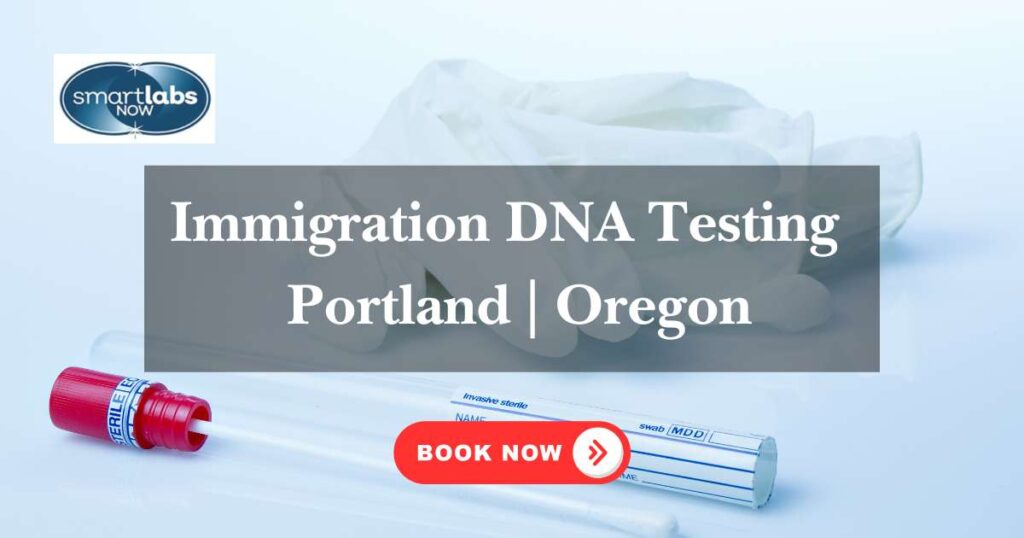
Navigating the immigration process can be challenging, especially when proving biological relationships is required.
DNA testing plays a crucial role in verifying family connections for visa applications, ensuring accuracy, and expediting approvals.
In Portland, Oregon, Smart Labs Now provides court-approved, fast, and discreet DNA immigration testing to help applicants meet immigration requirements with confidence.
BOOK NOW to prioritize your health with our gentle and professional testing services.
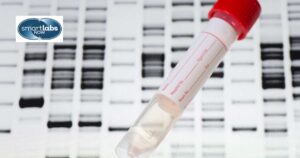
DNA testing is widely used in immigration cases to establish biological relationships when documentary evidence is insufficient.
The U.S. Citizenship and Immigration Services (USCIS), U.S. embassies, and consulates recommend DNA tests to verify parentage and sibling relationships for immigrant visa applications.
This 2021 resource published by the U.S. National Library of Medicine provides a comprehensive overview of genetic testing, including its purpose, types, and implications.
The American Association of Blood Banks (AABB) authorizes only accredited laboratories to conduct immigration-related DNA tests.
These tests determine the genetic connection between individuals, helping establish legal ties between petitioners and beneficiaries.
Proving a biological relationship is essential when supporting an immigration application.
DNA testing differentiates between full and half-sibling relationships with high accuracy.
Maternity and paternity tests confirm biological ties between parents and children.
DNA results help visa applicants establish eligibility when official records are insufficient or unavailable.
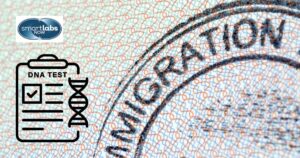
Testing is an integral part of the immigrant visa application process, particularly when official documentation is missing or inadequate.
U.S. immigration authorities require DNA testing to verify family relationships before visa issuance.
This 2023 article published by The DNATests.com discusses the importance and role of DNA testing in immigration, outlining requirements and the legal process involved.
The American Association of Blood Banks oversees and accredits all laboratories authorized for immigration DNA testing.
Plays a critical role in the immigration DNA testing process, ensuring that applicants follow proper procedures at U.S. embassies or consulates.
Employed to confirm family connections when other forms of evidence are inconclusive.
Essential for proving eligibility for family-sponsored immigration.
Determines whether individuals share both or one biological parent.
Scientific confirmation of a blood relationship between petitioner and beneficiary.
Used to establish a direct parent-child relationship when birth certificates are unavailable or unreliable.
Critical in cases involving children born out of wedlock or with disputed parentage claims.
DNA testing helps finalize applications when kinship must be established.
After verification, DNA test results contribute to determining visa eligibility and approval.

DNA testing is highly reliable, with industry-accepted standards ensuring precision.
This 2021 document by the U.S. Department of State details the procedures for DNA relationship testing, emphasizing the accuracy and reliability of DNA tests in confirming biological relationships.
Immigration authorities require tests to be conducted at an AABB collection site, guaranteeing credibility and authenticity.
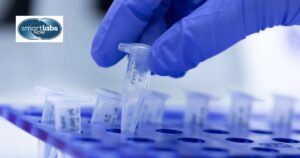
Different DNA sample collection methods are used based on accuracy, convenience, and non-invasiveness.
The most common, painless, and non-invasive method.
Another term for buccal swab, ensuring minimal discomfort.
Occasionally required for additional verification but not commonly used.
Ensure sample collection is painless and hassle-free.
Followed strictly to prevent contamination and ensure valid results.
Petitioners, typically U.S. citizens or legal residents sponsoring a relative, must undergo DNA testing at an AABB laboratory to verify the claimed relationship.

Visa applicants must undergo DNA testing at a designated facility to confirm their biological relationship with the petitioner.
Ensures compliance with immigration requirements.
Oversees the sample collection process for visa applicants.
Responsible for coordinating DNA testing at embassies and consulates.
Applicants are required to cover the cost of testing.
Provided by an accredited lab and sent to the designated collection site.
Supervises the testing process to ensure integrity.
The preferred, painless method for DNA collection.
Medical professionals authorized to collect samples.
Verified through DNA testing before visa approval.
Required for visa applicants during sample collection.
The applicant’s passport must be presented as part of the identification process.
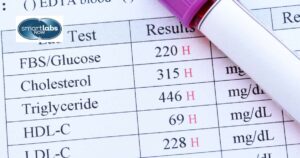
After DNA testing is completed, applicants and petitioners receive results that impact visa processing and immigration decisions.
This 2023 article published by Medical News Today provides insights into receiving and interpreting genetic test results, including understanding the implications of findings.
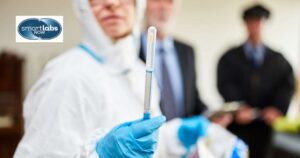
This section explores the differences between legal, forensic, and at-home DNA testing.
This 2021 resource published by the U.S. National Library of Medicine discusses various aspects of genetic testing, including distinctions between legal and forensic applications.
Strict protocols govern legal DNA tests to ensure the integrity and admissibility of the results in legal proceedings.
These tests are essential for various legal cases, including:
Maintaining a chain of custody ensures that an independent third party correctly collects and handles the samples.
Investigators use forensic DNA testing in criminal cases to analyze DNA evidence from crime scenes.
It shares similarities with legal DNA testing in requiring strict protocols but is not commonly used in immigration processes.
At-home paternity test kits are for personal use and lack legal validity.
Individuals can collect their own DNA samples; however, since no independent verification occurs, these tests cannot serve as legal evidence.
Alternative methods include hair follicle paternity tests and toothbrush DNA tests, though these are less common and may not be as reliable or widely accepted for legal purposes.
Immigration DNA tests verify biological relationships for immigration benefits.
The U.S. Department of State and USCIS may recommend DNA testing as outlined in 9 FAM 601.11.
A Request for Evidence (RFE) might be issued if additional evidence is needed.
DNA testing can be relevant in citizenship claims as mentioned in 8 FAM 304.2.
DNA tests provide evidence of biological relationships and support citizenship applications alongside other documentation.
Immigration DNA testing confirms biological relationships for visa and citizenship applications when other documents are insufficient.
Ans: An AABB-accredited DNA test ensures the laboratory meets high standards for accuracy and chain of custody, making the results legally valid for immigration purposes.
Ans: U.S. embassies issue the CRBA as an official document for children born abroad to U.S. citizens, confirming U.S. citizenship.
Ans: DNA collection kits contain materials and instructions for collecting a DNA sample, typically through cheek swabs, to ensure proper handling and legal compliance.
Ans: Embassies oversee the collection of DNA samples, maintain chain of custody, and may forward samples to accredited labs for analysis.
Ans: The I-130 petition establishes a family relationship for immigration. If documents are insufficient, an RFE may require DNA testing to confirm the relationship.
Ans: DNA testing helps prove biological relationships in visa applications when documentation, such as birth certificates, is unavailable or unclear.
Ans: The N-400 form is for U.S. naturalization. You may need DNA testing to confirm family relationships when applying for citizenship.
Ans: Common tests include:
Smart Labs Now is a trusted provider of DNA testing services for immigration in Portland, Oregon.
Our accredited facility ensures accurate, reliable, and government-approved testing.

We offer fast processing, affordable rates, and discreet services to help you complete your immigration journey stress-free.
BOOK NOW to prioritize your health with our gentle and professional testing services.
DISCLAIMER:
Please consult your primary care physician before engaging with any pharmaceutical, natural substances, or activity regimens mentioned or prescribed in this post. Smart Labs Now is not responsible for health or life outcomes based on the information or recommendations provided. This account does not serve as a substitute for professional medical advice/help.